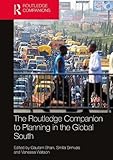Routledge Companion to Planning in The Global South
Contributor(s): Bhan, Gautam | Srinivas, Smita | Watson, Vanessa.
Publisher: London Routledge 2018Description: xviii, 396p.ISBN: 9781138932814.Subject(s): Developing countries -- Regional planning -- City planning -- Economic development -- Urban policyDDC classification: 307.1209724 Summary: The Routledge Companion to Planning in the Global South offers an edited collection on planning in parts of the world which, more often than not, are unrecognised or unmarked in mainstream planning texts. In doing so, its intention is not to fill a 'gap' that leaves this 'mainstream' unquestioned but to re-theorise planning from a deep understanding of 'place' as well as a commitment to recognise the diverse modes of practice that come within it. The chapters thus take the form, not of generalised, 'universal' analyses and prescriptions, but instead are critical and located reflections in thinking about how to plan, act and intervene in the highly complex city, regional and national contexts. Chapter authors in this Companion are not all planners or are planners of very different kinds, and this diversity ensures a rich variety of insights, primarily based on cases, to emphasise the complexity of the world in which planning is expected to happen. The book is divided into a framing Introduction followed by five sections: planning and the state; economy and economic actors; new drivers of urban change; landscapes of citizenship; and planning pedagogy. This volume will be of interest to all those wanting to explore the complexities of planning practice and the need for new theories of knowledge from which to draw insight to face the challenges of the 21st century| Item type | Current location | Call number | Status | Date due | Barcode |
|---|---|---|---|---|---|
 Books
Books
|
NASSDOC Library | 307.1209724 ROU- (Browse shelf) | Available | 50342 |
Include Index
The Routledge Companion to Planning in the Global South offers an edited collection on planning in parts of the world which, more often than not, are unrecognised or unmarked in mainstream planning texts. In doing so, its intention is not to fill a 'gap' that leaves this 'mainstream' unquestioned but to re-theorise planning from a deep understanding of 'place' as well as a commitment to recognise the diverse modes of practice that come within it.
The chapters thus take the form, not of generalised, 'universal' analyses and prescriptions, but instead are critical and located reflections in thinking about how to plan, act and intervene in the highly complex city, regional and national contexts. Chapter authors in this Companion are not all planners or are planners of very different kinds, and this diversity ensures a rich variety of insights, primarily based on cases, to emphasise the complexity of the world in which planning is expected to happen.
The book is divided into a framing Introduction followed by five sections: planning and the state; economy and economic actors; new drivers of urban change; landscapes of citizenship; and planning pedagogy. This volume will be of interest to all those wanting to explore the complexities of planning practice and the need for new theories of knowledge from which to draw insight to face the challenges of the 21st century


There are no comments for this item.